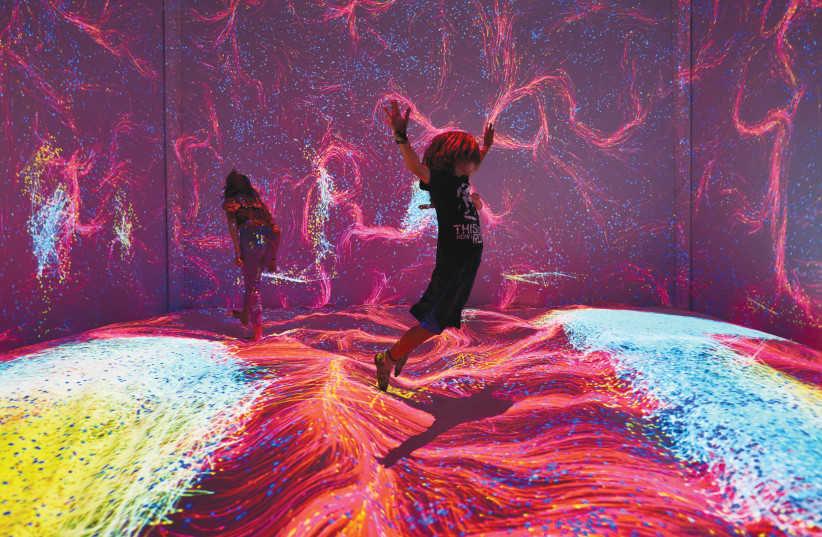The future of technology, virtual reality in particular, is a popular, though at times hotly debated subject. Companies such as Meta are dedicating increasingly significant amounts of time and money toward the research and development of virtual reality products, and the VR market is predicted to be worth $87 billion by 2030. Despite its anticipated upward trajectory, there has also been some concern over potential negative effects that certain facets of the industry may present.
Many question what a future, where one is able to “see” or “do” anything through a headset without having to leave the house, will look like. Will our capacity to socialize in real-life situations be at risk? Will the needs of our physical bodies become neglected as we venture further into non-physical worlds? Research has yet to say for sure, but perhaps there is a way to approach this booming area of technology that utilizes its positive potential while also encouraging physical activity, creativity and community in the outside world.
For the first time, a revolutionary Israeli development is bridging the gap between virtual reality and real-world social interaction. The entertainment multiverse complex XSPACE opened on the exhibition grounds of the Tel Aviv Expo Center on August 4, and plans for future locations around the world are already in the works.
What is it?
The experience is designed to bring together technology, art and animation in a completely immersive, headset-free environment. Upon entry, visitors receive a souvenir smart bracelet and undergo a scan to create a personalized avatar. They’re then invited to continue into the complex and explore its many rooms, each of which features different interactive games and activities. The bracelet can be used to keep track of a player’s scores and create videos of their journey, all of which can be accessed following the visit via a free personalized landing page.

In the main room, visitors can play an interactive run-and-collect game by standing on a hoverboard in front of a screen. By shifting balance from foot to foot, they control an avatar as it collects virtual coins. Another room, inspired by popular “selfie museums,” is full of green screens that act as backdrops for personalized videos.
A third room includes what can only be described as a moon bounce reinvented for the 21st century. Children are free to run and jump on a trampoline-like surface, creating a trail of bright marks and patterns around them as they play. Also in this room is a station where visitors can color in pictures of creatures such as butterflies. The pictures are scanned and then appear as moving 3D images on a screen.
The idea for XSPACE was born in 2016 after co-founder and CEO Carmi Wurtman, a long-time event promoter, brought the art, science and technology festival Geek Picnic to Israel from Russia. Wurtman realized that this type of event posed fewer challenges relative to production than those centered around a single performer while also inspiring people to come together through shared interests. The COVID-19 pandemic slowed development a bit, but this cloud was not without a silver lining – the delays led to changes that would ultimately make the project a 100% Israeli invention.
“As opposed to bringing international acts to Israel, I thought it’d be amazing to create something from Israel and take it to the world,” he explained.
The experience debut
FOR ITS DEBUT experience, XSPACE takes players through an original outer space mission, though one of the company’s long-term goals is to partner with global brands to create experiences designed around well-known fictional worlds and characters. Wurtman elaborated with an example.
“If you think of [something] like SpongeBob, many times you have the TV show itself and a video game. It’s all in the digital world. XSPACE is a way to connect it to the physical world. We could have a game or venue prepared for the new season of a particular show to offer a full 360 experience.”
The idea is that the space will function like an interactive movie theater. Different shows will play at different times, but the physical space doesn’t need to change. An experience designed for kids may run throughout the day, while programs with more mature themes can serve as an opportunity for adults to get out and socialize at night. Some companies have already inquired about hosting corporate events in the complex.
Referring to what he calls the “live gaming component,” Wurtman continued, “I have kids and all day, they’re playing games with their friends or even people internationally, but it’s always in front of a screen. Here, they can have positive digital experiences where people can come and play together.”
True to his musical background, Wurtman hopes that XSPACE will one day offer programs featuring popular past and present musical artists, giving visitors the opportunity to engage with works and performances in a more tangible way than they would with a VR headset. The company is currently in talks with the estate managers of several well-known artists about future collaborations.
Tickets cost NIS 119, though they can be purchased at a discount through some clubs and credit card companies. For more information, visit the XSPACE website or Instagram.
